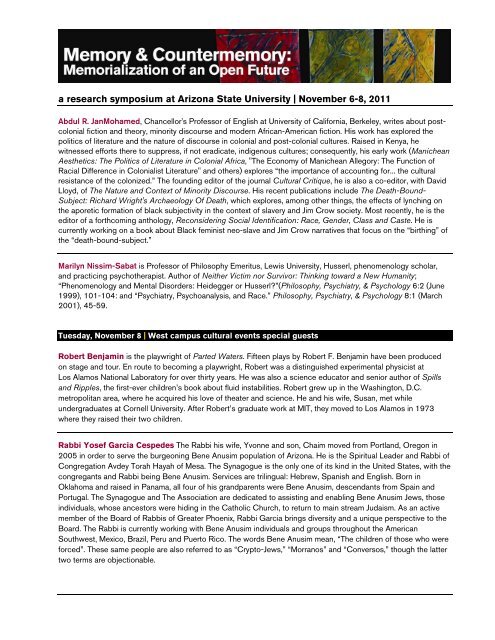Symposium Program (printable PDF) - ASU Jewish Studies
Symposium Program (printable PDF) - ASU Jewish Studies
Symposium Program (printable PDF) - ASU Jewish Studies
You also want an ePaper? Increase the reach of your titles
YUMPU automatically turns print PDFs into web optimized ePapers that Google loves.
a research symposium at Arizona State University | November 6-8, 2011Abdul R. JanMohamed, Chancellor's Professor of English at University of California, Berkeley, writes about postcolonialfiction and theory, minority discourse and modern African-American fiction. His work has explored thepolitics of literature and the nature of discourse in colonial and post-colonial cultures. Raised in Kenya, hewitnessed efforts there to suppress, if not eradicate, indigenous cultures; consequently, his early work (ManicheanAesthetics: The Politics of Literature in Colonial Africa, "The Economy of Manichean Allegory: The Function ofRacial Difference in Colonialist Literature" and others) explores “the importance of accounting for... the culturalresistance of the colonized.” The founding editor of the journal Cultural Critique, he is also a co-editor, with DavidLloyd, of The Nature and Context of Minority Discourse. His recent publications include The Death-Bound-Subject: Richard Wright's Archaeology Of Death, which explores, among other things, the effects of lynching onthe aporetic formation of black subjectivity in the context of slavery and Jim Crow society. Most recently, he is theeditor of a forthcoming anthology, Reconsidering Social Identification: Race, Gender, Class and Caste. He iscurrently working on a book about Black feminist neo-slave and Jim Crow narratives that focus on the “birthing” ofthe “death-bound-subject.”Marilyn Nissim-Sabat is Professor of Philosophy Emeritus, Lewis University, Husserl, phenomenology scholar,and practicing psychotherapist. Author of Neither Victim nor Survivor: Thinking toward a New Humanity;“Phenomenology and Mental Disorders: Heidegger or Husserl?”(Philosophy, Psychiatry, & Psychology 6:2 (June1999), 101-104: and “Psychiatry, Psychoanalysis, and Race.” Philosophy, Psychiatry, & Psychology 8:1 (March2001), 45-59.Tuesday, November 8 | West campus cultural events special guestsRobert Benjamin is the playwright of Parted Waters. Fifteen plays by Robert F. Benjamin have been producedon stage and tour. En route to becoming a playwright, Robert was a distinguished experimental physicist atLos Alamos National Laboratory for over thirty years. He was also a science educator and senior author of Spillsand Ripples, the first-ever children’s book about fluid instabilities. Robert grew up in the Washington, D.C.metropolitan area, where he acquired his love of theater and science. He and his wife, Susan, met whileundergraduates at Cornell University. After Robert’s graduate work at MIT, they moved to Los Alamos in 1973where they raised their two children.Rabbi Yosef Garcia Cespedes The Rabbi his wife, Yvonne and son, Chaim moved from Portland, Oregon in2005 in order to serve the burgeoning Bene Anusim population of Arizona. He is the Spiritual Leader and Rabbi ofCongregation Avdey Torah Hayah of Mesa. The Synagogue is the only one of its kind in the United States, with thecongregants and Rabbi being Bene Anusim. Services are trilingual: Hebrew, Spanish and English. Born inOklahoma and raised in Panama, all four of his grandparents were Bene Anusim, descendants from Spain andPortugal. The Synagogue and The Association are dedicated to assisting and enabling Bene Anusim Jews, thoseindividuals, whose ancestors were hiding in the Catholic Church, to return to main stream Judaism. As an activemember of the Board of Rabbis of Greater Phoenix, Rabbi Garcia brings diversity and a unique perspective to theBoard. The Rabbi is currently working with Bene Anusim individuals and groups throughout the AmericanSouthwest, Mexico, Brazil, Peru and Puerto Rico. The words Bene Anusim mean, “The children of those who wereforced”. These same people are also referred to as “Crypto-Jews,” “Morranos” and “Conversos,” though the lattertwo terms are objectionable.


